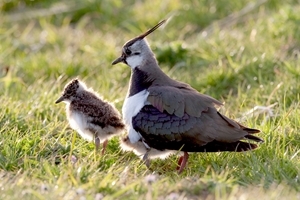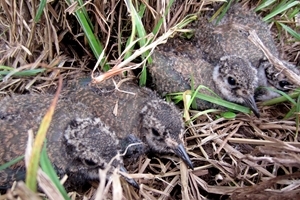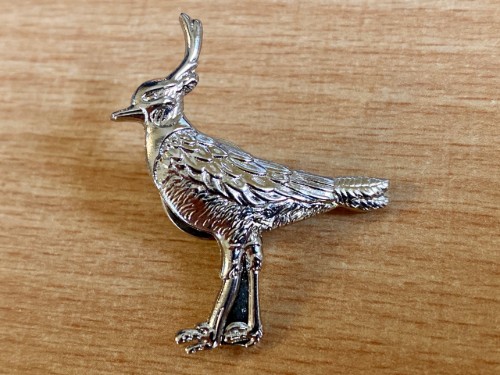 A new project by the Game & Wildlife Conservation Trust is trying to find out if larger numbers of lapwing chicks can survive on farmland fallow plots if provided with more space to hide from predators and increased levels of invertebrates to feed on.
A new project by the Game & Wildlife Conservation Trust is trying to find out if larger numbers of lapwing chicks can survive on farmland fallow plots if provided with more space to hide from predators and increased levels of invertebrates to feed on.
Researchers will be visiting sites on farms across Dorset, Hampshire, Wiltshire and Berkshire that implement fallow plots through their countryside stewardship schemes.
The UK breeding population of the northern lapwing (Vanellus vanellus) has declined by 48% over the past 25 years. This iconic farmland bird is now on the ‘Red List of Birds of Conservation Concern’ in the UK and classed as ‘Vulnerable’ in Europe.
It is estimated that 39% of breeding lapwings in England and Wales nest on arable land and fallow plots created by farmers have high occupancy by lapwings and nest survival.
The research team will also be revisiting farms involved in previous fallow plot research carried out by the GWCT between 2012 and 2016, to investigate whether there are still lapwing present in these areas.
The GWCT has been awarded a species recovery grant from Natural England to fund the two-year-long project.
Reversing the decline
 Lizzie Grayshon, GWCT Wetlands Ecologist, who is leading the project, said: “Sadly, not enough lapwing chicks are being produced to help the species recover. This project aims to investigate whether a simple option of providing more cover and food could improve chick survival.”
Lizzie Grayshon, GWCT Wetlands Ecologist, who is leading the project, said: “Sadly, not enough lapwing chicks are being produced to help the species recover. This project aims to investigate whether a simple option of providing more cover and food could improve chick survival.”
One objective is to devise and trial a cost-effective brood cover seed mix, which will be easily planted by farmers alongside fallow plots. This brood cover may increase lapwing chick survival sufficiently for overall productivity to exceed the level required to maintain a stable population – 0.7 fledged chicks per pair – by increasing invertebrate abundance that make up chick food, and creating areas of cover where they can hide from predators.
In spring 2023 the study team visited 44 fallow plots on 23 different farms. Lapwing were present and breeding on 19 of the plots.
Pitfall traps – where invertebrates are collected – were placed on 40 fallow plots from across all 23 farms for one week. This resulted in 320 pitfall samples.
Surveys will begin in March 2024 to assess lapwing breeding success and habitat use across the plots, with and without the new brood cover strip, to compare survival rates.
The invertebrate pitfall sampling will then be repeated in May next year to see if the new brood cover strips have created more invertebrates for lapwing chicks to feed on.
Motivation for farmers, limiting factors on plot siting and management, and willingness to try additional measures will be evaluated from a large sample of farmers, extending outside the Wessex region, through a questionnaire. The results of this will inform future fallow plot option prescriptions and payment level.
If you are a farmer or land manager with a fallow plot on your land and you are willing to take park in our survey, please do get in touch!

Get your GWCT Lapwing Badge for £9.99
£5 from the sale of each badge goes directly to our Wader Tracking Appeal
You can support our biggest tracking project yet and help curlew, lapwing and woodcock with our brand new lapwing pin badge. £5 from the sale of each badge goes toward this vital project. Badge measures approx 3cm x 3.5cm.
View Badge >
or
Buy Now - £9.99 >
100% Secure. All Credit & Debit cards, PayPal, Apple Pay and Google Pay accepted.

Notes to editors
The Game & Wildlife Conservation Trust – providing research-led conservation for a thriving countryside. The GWCT is an independent wildlife conservation charity which has carried out scientific research into Britain’s game and wildlife since the 1930s. We advise farmers and landowners on improving wildlife habitats. We employ more than 60 post-doctoral scientists and other research staff with expertise in areas such as birds, insects, mammals, farming, fish and statistics. We undertake our own research as well as projects funded by contract and grant-aid from government and private bodies.
For information, contact:
Eleanor Williams
Telephone: 07592 025476
Email: press@gwct.org.uk